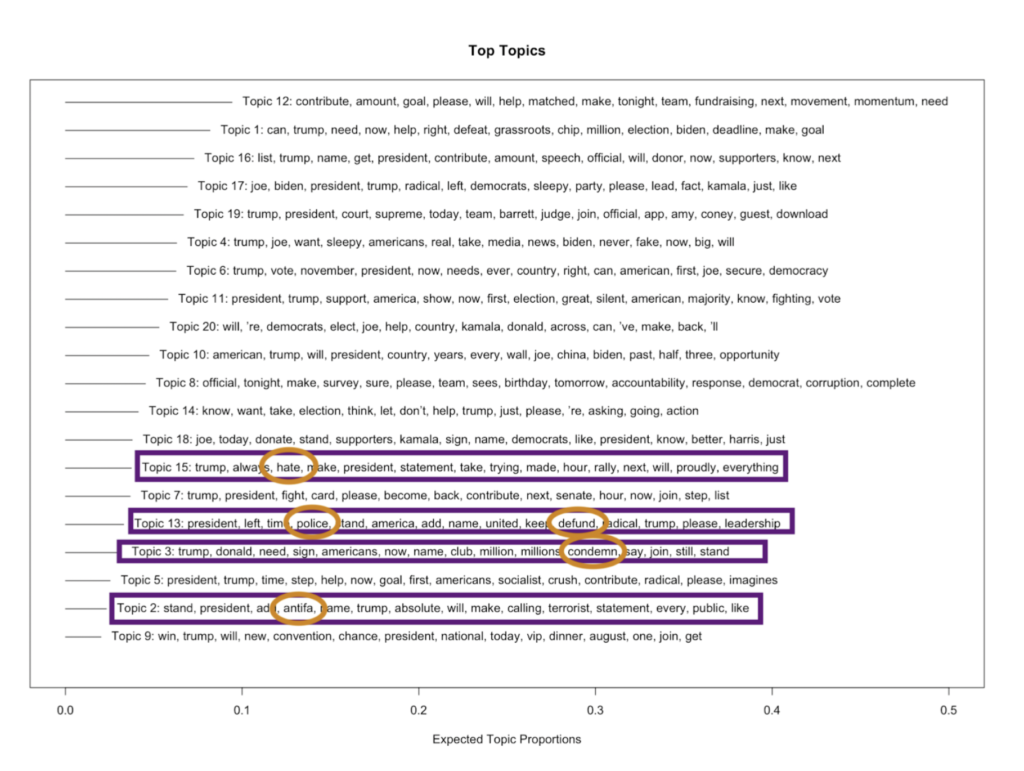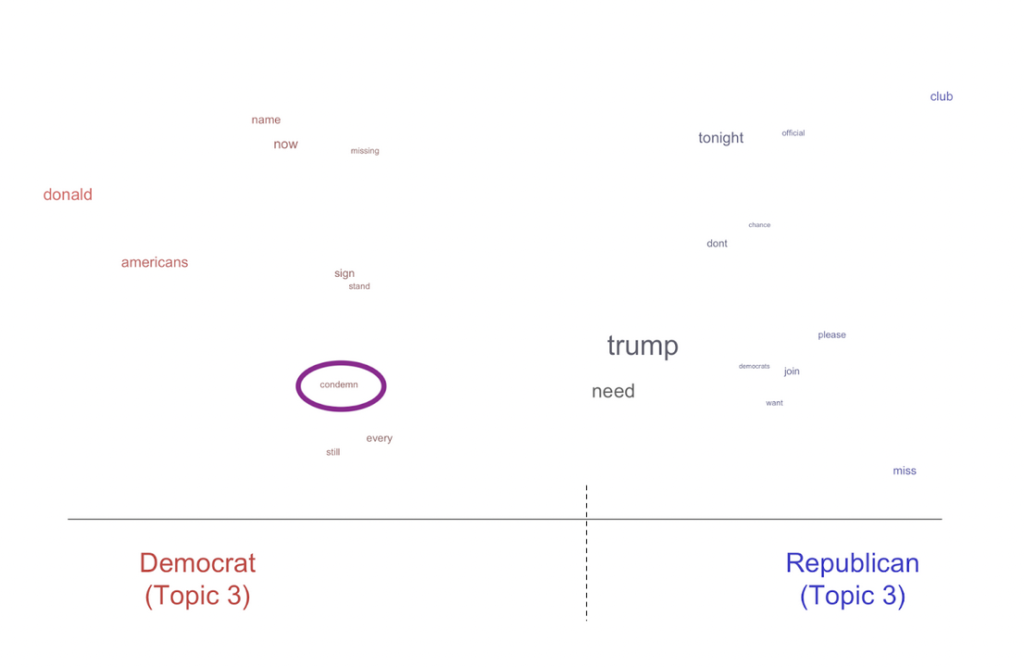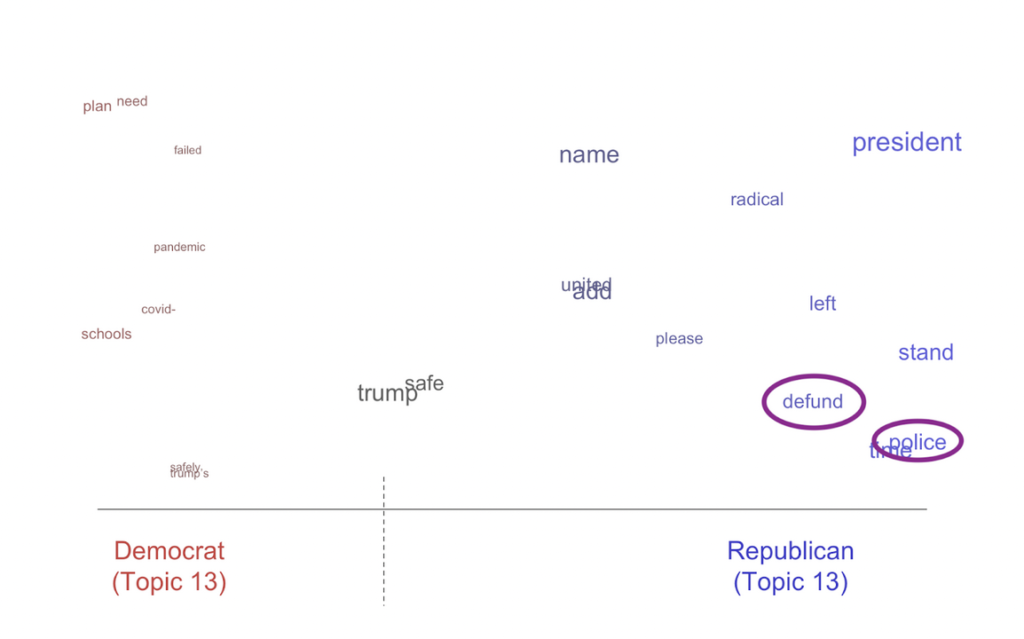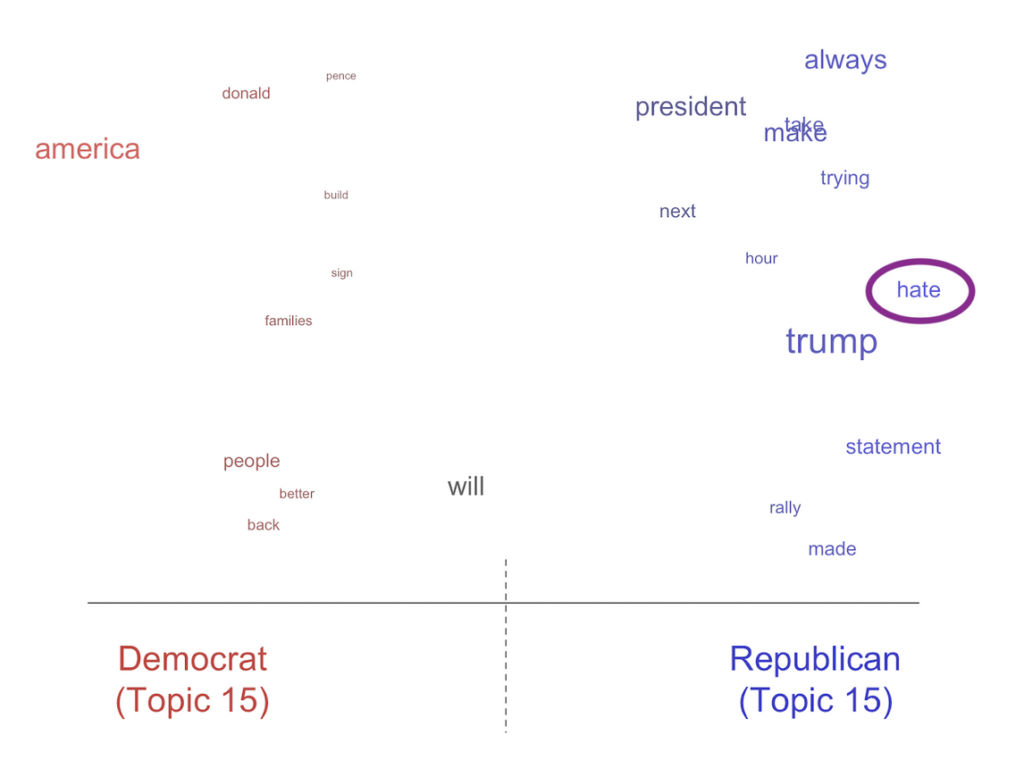This research centers around discussions of race and racial justice in Facebook campaign advertisements run during the 2020 election cycle. More specifically, this research analyzed Facebook campaign advertisements run by 2020 presidential and Georgia Senate special candidates in the state of Georgia. 2020 marked a watershed in the contemporary fight for racial justice in the United States following the highly publicized murders of innocent Black people like George Floyd, Breonna Taylor, and Ahmaud Arbery. The Georgia Senate special elections in particular were a major talking point due to national campaigns led by people like former Georgia State Rep. Stacey Abrams and activist LaTosha Brown to increase Black votership across the state. By reading this blog post, audiences will gain a better understanding of how politicians discussed race and racial justice during this major moment in contemporary American history.
The initial query for the advertisements analyzed in this research pulled a dataset containing 232,214 ads that were run from March 13, 2020 to November 1, 2020. I restricted this dataset to ads ran on and after May 25, 2020, the day of George Floyd’s murder in Minneapolis, Minnesota, which resulted in a collection of 175,809 Facebook ads run by the official Facebook pages of Joe Biden, Donald J. Trump, Rev. Raphael Warnock, Kelly Loeffler, Jon Ossoff and David Perdue.
I also constructed a variable called partisanship to indicate whether a candidate sponsor was a Democrat or Republican to better understand how the two parties discussed race and racial justice through Facebook advertising. I then ran a structural topic model (Roberts et al. 2014) on the ads using partisanship and the creative text of the advertisements to inform the model’s topic interpretations.
Topic models generally allow researchers to explore the topics addressed within a set of documents. What distinguishes structural topic models from normal topic models, however, is the incorporation of document metadata, which helps in tandem with variables like partisanship to estimate the impact of political affiliation on how Democrats and Republicans use a given keyword. Although manual content analysis of political text is important in understanding correlations between political affiliation and discussions of racial justice, a volume of 175,809 potentially relevant ads needed to be narrowed down by a machine prior to human analysis. That way, the structural topic model would produce a series of topic-based keywords that are both easily interpretable and easily usable in manual keyword search.
Once the structural topic model yielded its topic interpretations, I scanned the topics and noted the ones with keywords considered relevant to race and racial justice. Next, I conducted manual keyword search through all unique creative ad text bodies to contextualize said keywords.
After running the structural topic model on the restricted dataset, I found five keywords considered relevant to race and racial justice within four of the model’s twenty topic interpretations: “antifa”, “condemn”, “defund”, “hate”, and “police”. With the help of the partisanship variable, I then created a series of plots to visualize how political affiliation impacted the way these keywords were used in ads.

Two Republicans used the term “antifa” in their ads to denounce the left-wing anti-fascist and anti-racist Antifa movement. In one set of ads, U.S. Pres. Donald Trump called the group “dangerous MOBS” who cause “absolute mayhem by way of RIOTING and LOOTING.” Former Georgia senator Kelly Loeffler demanded that Antifa be dismantled in favor of funding the police, describing Antifa’s ideal future as “burned out storefronts”, “torn down statues”, and “communities in crisis.” Additionally, Loeffler claimed to be “fighting back against radical leftist groups like Antifa” to defend the values of her supporters because Antifa “is destroying our cities” and “must be stopped.”

Of the four politicians who used the term “defund” in their ads, three were Republicans who all decried defunding law enforcement as suggested by critics during the Black Lives Matter protests in 2020. Donald Trump asked audiences to stand with him and law enforcement officers against “the Left” and those who want to defund the police, while Kelly Loeffler disparaged Black Lives Matter as a “radical left-wing group that stands for anti-semitism, defunding the police, and destroying the nuclear family.” Former Georgia senator David Perdue claimed that Democratic U.S. Senator Jon Ossoff—along with his “radical Leftists [sic] allies”—“speaks hate” by supporting the defunding of law enforcement at a time when the U.S “needs reform, but not defunding police.” Lone Democrat Joe Biden used the keyword “defund” to clarify that he would not defund American police officers if elected and instead continue to fight for Social Security, which he claims Trump would defund if re-elected.
The Republicans continued to express their condemnation of defunding law enforcement through their use of the keyword “police”. Loeffler’s ads stated that she “will always defend [American] police against radical, violent anarchists” because they “keep our communities safe”, hence why Loeffler also wants “convicted cop killers in America to be sentenced to death.” Trump claimed that Pres. Joe Biden and Vice Pres. Kamala Harris “turned their backs on law enforcement” by supporting the defunding of law enforcement, which is why he is fighting for “LAW & ORDER” while “DEMOCRATS HAVE LOST THEIR MINDS” in supporting law enforcement defunding after the murder of George Floyd. In addition to deploring Jon Ossoff, Perdue argues that “the anarchy [Americans] see in Democrat-run cities will make us all less safe” if Democrats abolished the police.
Two Democratic politicians sponsored ads containing the keyword “police”, with Biden clarifying that he had no intention of defunding law enforcement. Instead, he promised to “work to rebuild the bonds of trust between police and the communities they are sworn to serve” by investing in community policing in order to “get more cops out of their cruisers, walking the streets, and developing real relationships with people in every neighborhood.”
Georgia senator Rev. Raphael Warnock was the only politician to not address law enforcement defunding. Instead, Warnock ran ads to establish solidarity with Black Lives Matter:
“The first time I got arrested, I was protesting the killing of Amadou Diallo who police shot at 41 times while reaching for his wallet on his front porch. The cops were found not guilty. 21 years later we’re still fighting for justice. #BlackLivesMatter”

Five politicians used the keyword “hate” in their ads, three of whom were Republicans and two who were Democrats. Generally speaking, politicians from either side of the aisle denounced the opposing party. Republicans Trump and Loeffler argued that Liberal Democrats hate all Republican values, while Democrats Biden and Warnock deplored the hateful politics of the Republican party. Biden condemned the “hate-fueled” rhetoric”, “violent, hate-fueled agenda”, and “hateful, divisive, and dangerous words and actions” of Donald Trump. Additionally, Biden referred to Trump as a man “who takes no responsibility, refuses to lead, blames others, cozies up to dictators, and fans the flames of hate and division”, while Warnock requested campaign donations to help “reject the GOP’s hateful and divisive politics” and elect him as Georgia’s first Black senator.

The findings gathered from this research suggest that Republicans were more critical of racial justice-related topics and policies than their Democratic opponents. If not ambivalent, Democrats were generally supportive of racial justice-related topics and policies.
As is the case with most Republicans, Donald Trump and Kelly Loeffler both rebuked Antifa, describing the group as engaging in violent activity that harms American communities. Such characterizations of Antifa —many of which have been disproven or debunked—have surrounded the movement following supporters’ participation in the 2020 Black Lives Matter protests (Bray 2020). Following the deadly insurrection at the U.S. Capitol in January 2021, Trump and his Republican allies falsely claimed that left-wing activists like Antifa led the insurrection to “make Trump look bad” (Oliphant and Kahn 2021).
Joe Biden’s fervent condemnation of Donald Trump for defending white supremacists highlights part of Trump’s controversial history concerning racism and racial justice. During the first debate of the 2020 presidential election cycle, Trump infamously instructed the far-right group The Proud Boys to “stand back and stand by” before condemning Antifa and “the Left” (Ronayne and Kunzelman 2020). Although not an explicit declaration of support for far-right extremist groups like the Proud Boys, the organization interpreted Trump’s words as such and celebrated his remarks (Frenkel and Karni 2020).
Although Biden’s condemnation of white supremacy matches his rhetoric around the subject beyond campaign ads, he never mentions Antifa in his advertisements. Expressing support for Antifa would likely alienate potential voters who do not support Antifa and contradict Biden’s actions beyond the campaign advertisements. In September of 2020, Biden condemned Antifa in an interview following the police-related death of an anti-fascist activist in the state of Washington who was shot and killed on suspicion that the activist had killed a right-wing protester in Portland, Oregon (Reuters 2020). When asked if he condemned Antifa, Biden responded, “Yes I do—violence no matter who it is.” By condemning both Antifa on the basis of condemning violence and white supremacy in his campaign ads, Biden does not align himself with either extreme of the political spectrum and prefers to take a moderate approach to discussing racial justice.
Defunding law enforcement proved to be possibly the most polarizing topic of racial justice mentioned in the findings of this research, as shown by the term distribution plot for Topic 13. Of the five politicians who used “defund” and/or “police” in their ads, only two explicitly mentioned the Black Lives Matter: Kelly Loeffler and Rev. Raphael Warnock. In addition to Loeffler and Warnock having run against each other in the 2020 Georgia Senate special elections, what makes this pair notable is the stark contrast in their reactions to the Black Lives Matter movement. Whereas Loeffler’s rhetoric depicted the movement as embodying antisemitism and destroying traditional American values like the nuclear family, Warnock openly shows support for Black Lives Matter and even shares an anecdote concerning his own struggles to fight for racial justice.
This support for the Black Lives Matter movement does not present as radically, however, as it would with any other politician discussed in this research because Warnock himself is Black and operates within predominantly Black spaces. In addition to being a Georgia State Senator, Warnock also serves as the senior pastor at Ebenezer Baptist Church in Atlanta, Georgia—the same church where Martin Luther King Jr. served as a pastor in the 1960s (Nilsen 2020). The Black church has historically rooted itself in community engagement and social justice and exists as “an institution wholly created by and for Black people” (Nilsen 2020). Warnock’s support of Black Lives Matter is a manifestation of his connections to his religious roots, his community, and his overall Blackness.
David Perdue’s claim that Jon Ossoff supports defunding the police—along with similar statements by other Republicans regarding Ossoff and Warnock’s stance on the matter—can be easily disproved.1 By saying it anyway, Perdue’s statement contributes to a broader pattern of Republican candidates using deceptive messaging and misinformation to portray Democratic opponents as radical liberals.
Perdue’s erroneous claim aside, Ossoff did not run any campaign advertisements about racial justice within the timeframe studied for this research. In fact, all of Ossoff’s ads concerned campaign donations and fundraising, something which distinguishes him from fellow Democrats Biden and Warnock, both of whom ran ads about both racial justice and campaign fundraising. Given how often racial justice was discussed after the murders of George Floyd and Breonna Taylor, Ossoff’s lack of address in his ads does raise questions. Considering Ossoff’s support of police reform and Black Lives Matter outside of online advertising, however, it is likely that Ossoff prioritized asking for campaign donations since his advertisements would reach a wide audience online.2
If I were to extend this research with more time and resources, I would start by lengthening the period of focus to include the murder of Breonna Taylor in Louisville, Kentucky on March 13, 2020. Although the deaths of Breonna Taylor and George Floyd were both heavily publicized in the media, the murder of George Floyd precipitated a mass of global discussions and protests concerning police brutality and racial justice. By involving Breonna Taylor’s murder in this research, I would get to see what comments or discussions arose after her murder and prior to that of George Floyd.
Additionally, I would also consider analyzing Facebook campaign ads run by politicians in other battleground state elections. Georgia stood out due to the amount of media attention garnered by the Senate special elections, but I would be interested in seeing how racial justice was addressed (if at all) in other parts of the 2020 battleground like Ohio, Pennsylvania, and Michigan.
Notes
- In a June 2020 interview with The Atlanta Journal-Constitution, Ossoff spoke in support of “reforming and demilitarizing policing in America” rather than defunding police departments, citing the “pervasive racism and classism in the criminal justice system that victimizes African Americans” and the “huge problem with police brutality” due to the heavy militarization of American police (Bluestein 2020).
- In addition to addressing police reform in his interview with the Atlanta Journal-Constitution, Ossoff also tweeted in support of the Black Lives Matter movement using the hashtag ‘#BlackLivesMatter’ in June 2020 (Jon Ossoff [@ossoff] 2020).
References
Bluestein, Greg. 2020. “Georgia’s Ossoff-Perdue Race for Senate Presents a Striking Contrast.” The Atlanta Journal-Constitution. https://www.ajc.com/news/state–regional-govt–politics/georgia-ossoff-perdue-race-for-senate-presents-striking-contrast/RSJsHEwpCBoEjfCBsKIHUK/ (May 12, 2022).
Bray, Mark. 2020. “Five Myths about Antifa.” Washington Post. https://www.washingtonpost.com/outlook/five-myths/five-myths-about-antifa/2020/09/11/527071ac-f37b-11ea-bc45-e5d48ab44b9f_story.html (May 9, 2022).
Frenkel, Sheera, and Annie Karni. 2020. “Proud Boys Celebrate Trump’s ‘Stand by’ Remark about Them at the Debate.” The New York Times. https://www.nytimes.com/2020/09/29/us/trump-proud-boys-biden.html (May 9, 2022).
Jon Ossoff [@ossoff]. 2020. “#BlackLivesMatter Https://T.Co/TjXiJhJjSK.” Twitter. https://twitter.com/ossoff/status/1270008160997253121 (May 12, 2022).
Nilsen, Ella. 2020. “Georgia Republicans Are Using Senate Candidate Raphael Warnock’s Sermons against Him.” Vox. https://www.vox.com/22163940/georgia-senate-race-raphael-warnock-sermons-loeffler (May 12, 2022).
Oliphant, James, and Chris Kahn. 2021. “Half of Republicans Believe False Accounts of Deadly U.S. Capitol Riot-Reuters/Ipsos Poll.” Reuters. https://www.reuters.com/article/us-usa-politics-disinformation-idUSKBN2BS0RZ (May 5, 2022).
Reuters. 2020. “Fact Check: Joe Biden Has Condemned Antifa, Violent Protests.” Reuters. https://www.reuters.com/article/uk-factcheck-biden-condemned-antifa-idUSKBN2712ZA (May 12, 2022).
Roberts, Margaret E. et al. 2014. “Structural Topic Models for Open‐Ended Survey Responses.” American Journal of Political Science 58(4): 1064–82.
Ronayne, Kathleen, and Michael Kunzelman. 2020. “Trump to Far-Right Extremists: ‘Stand Back and Stand By.’” Associated Press. https://apnews.com/article/election-2020-joe-biden-race-and-ethnicity-donald-trump-chris-wallace-0b32339da25fbc9e8b7c7c7066a1db0f (May 9, 2022).

